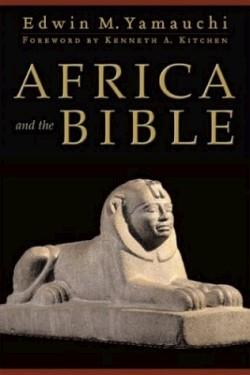Africa and the Bible
When Assyrian strongman Sennacherib led his forces on an invasion of Judah in the year 701, a flank attack by Africans from Egypt disrupted his assault. As reported in the books Isaiah and Kings in the Bible, the attack caused concern among the Assyrian high echelon. That scrap of
information, and similar shards and ciphers of the ancient world, are used by the author to piece together this insightful volume.
The Egyptian forces, Yamauchi writes, were led by Taharqa, the son of Piankhy, a black African from Cush (what is now the Sudan) who led a
successful invasion of Egypt. Scholars agree that Egypt, for more than one hundred years, was ruled by blacks who eventually were driven out by indigenous Egyptians.
The author worries: “As Afrocentric scholars push their thesis to extreme conclusions, they undermine their credibility by claiming one and all as black and therefore staking the claim of blacks to every imaginable cultural and intellectual achievement.”
Through careful research, Yamauchi succeeds in finding documentary evidence of African contributions to Mediterranean (hence Western)
civilization, while demolishing arguments of those Afrocentric historians who would have blacks responsible for everything from the Trojan War to Aristotelian logic.
Or, to put it another way, by claiming black genesis for all things important to civilization, some Afrocentric scholars are making the same mistake as that made by European historians and philosophers like Hegel, who wrote that “it is manifest that want of self-control distinguishes the character of the Negroes. This
condition is capable of no development or culture, and as we have seen them at this day, such have they always been.”
Yamauchi, a professor at Miami University in Ohio, who teaches courses in Biblical archaeology and church history, has the scholarship and gravitas to walk the fine line
between the historical racisms practiced by both blacks and whites. He has written or edited a variety of scholarly works on the Bible and early
civilization, and brings that mastery to this book.
Fittingly, he concludes his work with a
conscientious analysis of Martin Bernal’s Black Athena, a controversial book in which Bernal
attempted to prove that even the goddess Athena was black.
There’s a middle ground in history, a place where politics stop and scholarship walks alone. Yamauchi has contributed a fine work to the expansion of that common middle ground,
particularly as it relates to the thorny and contentious issues of race and history.
When Assyrian strongman Sennacherib led his forces on an invasion of Judah in the year 701, a flank attack by Africans from Egypt disrupted his assault. As reported in the books Isaiah and Kings in the Bible, the attack caused concern among the Assyrian high echelon. That scrap of
information, and similar shards and ciphers of the ancient world, are used by the author to piece together this insightful volume.
The Egyptian forces, Yamauchi writes, were led by Taharqa, the son of Piankhy, a black African from Cush (what is now the Sudan) who led a
successful invasion of Egypt. Scholars agree that Egypt, for more than one hundred years, was ruled by blacks who eventually were driven out by indigenous Egyptians.
The author worries: “As Afrocentric scholars push their thesis to extreme conclusions, they undermine their credibility by claiming one and all as black and therefore staking the claim of blacks to every imaginable cultural and intellectual achievement.”
Through careful research, Yamauchi succeeds in finding documentary evidence of African contributions to Mediterranean (hence Western)
civilization, while demolishing arguments of those Afrocentric historians who would have blacks responsible for everything from the
Trojan War to Aristotelian logic.
Or, to put it another way, by claiming black genesis for all things important to civilization, some Afrocentric scholars are making the same mistake as that made by European historians and philosophers like Hegel, who wrote that “it is manifest that want of self-control distinguishes the character of the Negroes. This
condition is capable of no development or culture, and as we have seen them at this day, such have they always been.”
Yamauchi, a professor at Miami University in Ohio, who teaches courses in Biblical archaeology and church history, has the scholarship and gravitas to walk the fine line
between the historical racisms practiced by both blacks and whites. He has written or edited a variety of scholarly works on the Bible and early
civilization, and brings that mastery
to this book.
Fittingly, he concludes his work with a conscientious analysis of Martin Bernal’s Black Athena, a controversial book in which Bernal
attempted to prove that even the goddess Athena was black.
There’s a middle ground in history, a place where politics stop and scholarship walks alone. Yamauchi has contributed a fine work to the
expansion of that common middle ground,
particularly as it relates to the thorny and contentious issues of race and history.
Reviewed by
James Abraham
Disclosure: This article is not an endorsement, but a review. The publisher of this book provided free copies of the book to have their book reviewed by a professional reviewer. No fee was paid by the publisher for this review. Foreword Reviews only recommends books that we love. Foreword Magazine, Inc. is disclosing this in accordance with the Federal Trade Commission’s 16 CFR, Part 255.

